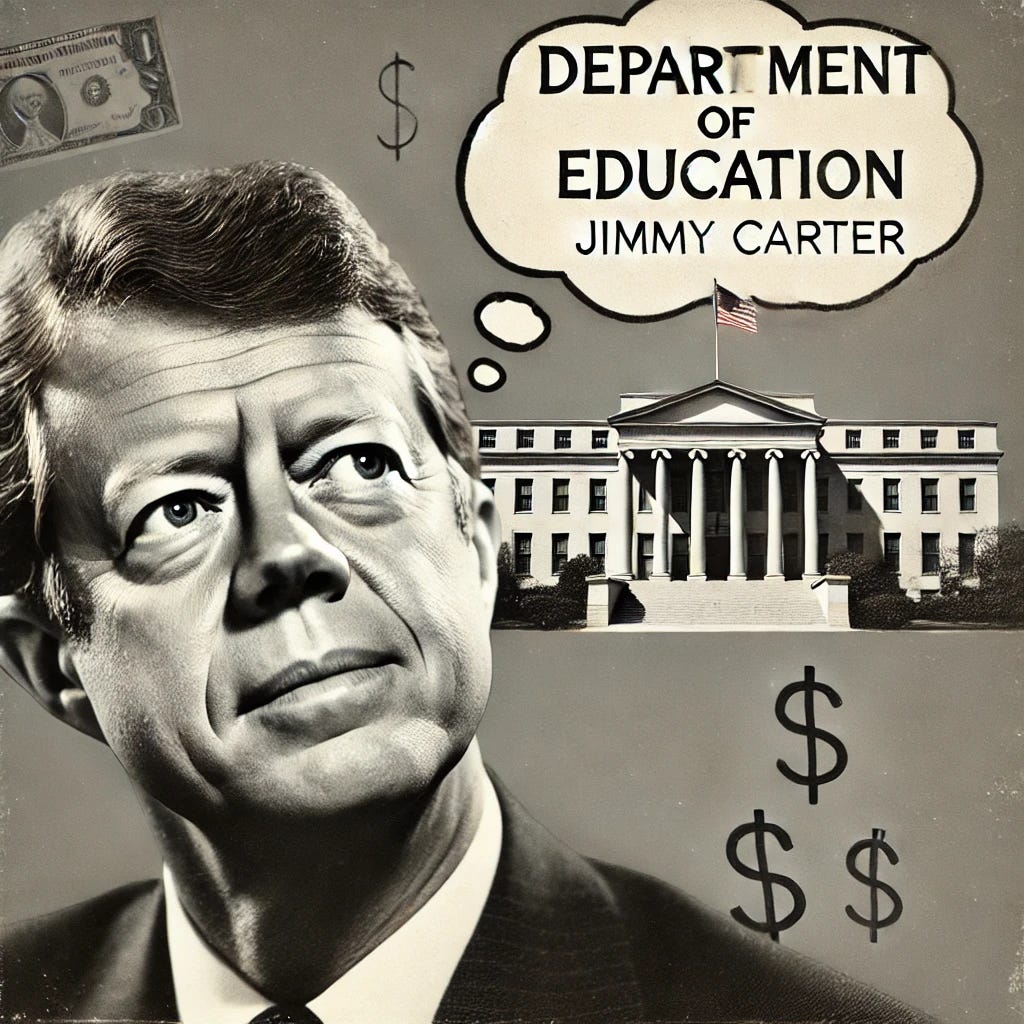Is Federal Control Failing Our Public Schools? 45 Years of Failure Says YES!
The Department of Education: A 45-Year Experiment in Federal Overreach. Discover How Returning Power to States and Local Communities Could Restore the Public Education Our Founders Intended.
Ah, the Department of Education—a monument to federal overreach that we never actually asked for. How did we get here, you ask? Well, let's rewind to 1979, when President Jimmy Carter, in his infinite wisdom, decided to add yet another layer to our ever-growing federal bureaucracy. The Department of Education was established as a favor to the National Education Association (NEA), a powerful teachers' union, in exchange for their political support when he ran for president. That's right, folks—your tax dollars at work! Carter thought centralizing education at the federal level was a great idea, despite the fact that education had traditionally been a state and local issue since, you know, the founding of the Republic.
In other words, the Department of Education wasn’t born out of some noble cause to improve education. Nope, it was all about politics and control. Keep in mind, the Founders didn't exactly carve out a space in the Constitution for the feds to meddle in classrooms. In fact, Thomas Jefferson argued for a decentralized system of education (see Bill for the More General Diffusion of Knowledge) run by local governments. The Tenth Amendment pretty much gives states the authority to handle it, yet here we are with the federal government holding tightly the purse strings to our schools.
So, why should we abolish it? Well, for starters, has federal control improved education? Short answer: No. In fact, student performance has flat-lined or worsened since 1979, despite billions poured into the system. It's become a bloated bureaucracy, sucking up resources that could be better used by states and local communities to tailor education to their specific needs. You don’t need a PhD to figure out that local control works better than one-size-fits-all policies dictated by distant bureaucrats.
But advised that abolishing the Department of Education isn’t exactly a walk in the park. Since its creation, it’s become a bloated beast with massive influence over states due to its control over federal education funding ($90 billion in discretionary spending for 2024). But, it's not impossible. The first step? We need a Congress with the guts to reclaim the powers they’ve outsourced to the executive branch. Legislation could be introduced to phase it out, redirecting its budget to states, who can decide how best to use it. Remember, Ronald Reagan wanted to get rid of it, but even he couldn’t get it done due to the entrenched interests in D.C. that love federal control and the juicy contracts it brings. No wonder it's called "the swamp."
For what it’s worth, abolishing the Department would most certainly improve the quality of education by restoring power to those closest to the students—parents, teachers, and local communities. If we’re serious about giving the next generation a shot at a meaningful education, we need to cut the bureaucratic middleman out of the equation. Let’s Restore First Principles: education is best handled by the states and local communities, as envisioned by the Founders.
So, the next time someone tries to tell you the Department of Education is essential, just ask them how that's been working out for the last 45+ years. Spoiler Alert: it hasn’t.
Just Sayin…




The transformationist progressives manipulate language in order to indoctrinate people (as one example of many, their theft of the word "liberal" to describe themselves).
We can reverse the process by eliminating the word "public" when describing our school system - they are Government Schools, plain and simple. Which promote and teach the Government narratives.
The same applies to the term "public lands" . . . they are Government Lands, owned and operated by governments.
Absolutely, first amendment to discuss at an article V convention